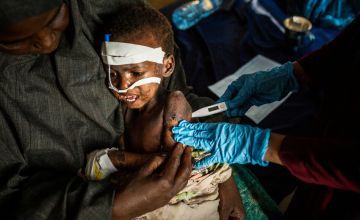
Read our 2023 annual report

Knowledge Hub
Hundreds of thousands could die in Somalia without urgent intervention

Urgent funding for life-saving aid is needed in Somalia to avert famine and hundreds of thousands of hunger-related deaths, Concern Worldwide has warned.
The warning from the Irish humanitarian organisation, which has teams in the East African nation, comes as Somalia continues to suffer its worst drought in many years along with ongoing conflict and rising fuel and food prices.
The United Nations Office for the Coordination of Humanitarian Affairs (OCHA) has warned that by this summer 350,000 of the 1.4 million severely malnourished children in the country may perish if nothing is done to help them now.
“It is too late when children start dying from severe malnutrition and disease,” said Concern’s Somalia Country Director, Abdi-Rashid Haji Nur.
“Tragically, it is children who are always the first to suffer.
“If it doesn’t rain by the end of April and Somalia still doesn’t have sufficient financial aid to help the 4.5 million people impacted then the situation will deteriorate and a famine may be declared in some regions.
“Right now, there are over 700,000 people who have had to leave their villages, some travelling for days in severe heat, to reach urban centres where they think they can access support.
“Concern is in areas that have a very high risk of famine declaration and where parents struggle to find enough clean water and food for themselves and their children. They come to Concern and its partner run nutrition clinics with emaciated babies in desperate need of support.
“This drought, which we believe is linked to climate change, effects the entire Horn of Africa region, meaning cross border traditional coping strategies for pastoralists and others are not helping much.”
Mr Abdi-Rashid noted that there were strong similarities between what was happening now and in the run up to the Somalia famine in 2011 when the international community didn’t respond quickly to warnings and over 258,000 people died.
“The world prevented another famine from being declared in Somalia in 2016/2017 after warnings and appeals were issued for the 6.2 million people who needed support then and this can be done again,” said Mr Abdi-Rashid.
“Just 4 per cent of the $1.5 billion (€1.3 billion) the UN says is needed to fund Somalia’s humanitarian response has so far been donated by governments from around the world.”
Concern is currently helping hundreds of thousands of families impacted by the drought in Somalia, thanks to donations from the Irish public, Irish Aid (the government’s programme for overseas development), the EU’s Directorate for Civil Protection and Humanitarian Operations, the UK’s Foreign, Commonwealth and Development Office and other donors.
Concern’s response includes:
- Supporting 24 health centres (including 10 mobile clinics) to treat tens of thousands of children and adults suffering from severe malnutrition and other illness, such as diarrhea and measles;
- Providing emergency water supply to almost 93,000 people in the affected regions through water trucking and pipelines;
- Giving $1.48 million (€1.36 million) in unconditional cash transfers to 11,236 households for them to buy essential items locally, which includes $951,210 (€874,299) from the ECHO funded Somali Cash Consortium for 5,151 households to support them between April and June this year in drought affected areas;
- Providing emergency education to 3,000 children in five locations thanks to Irish Aid support.
Concern is among the signatories of a letter from the Somali NGO Consortium sent on April 6 to UN Secretary-General António Guterres appealing for urgent help to avert a possible famine in Somalia in 2022.
Somalia, which was ranked last in the 2021 Global Hunger Index measuring food insecurity in 135 nations, has also seen significant livestock deaths as pasture and water had vanished and agricultural land became unusable due to the drought.
The country is so dry that the Juba and Shabelle Rivers barely have any water left.
“We need all the support we can get from well-wishers across the world to urgently provide life-saving humanitarian support to people affected by this devastating drought,” added Mr Abdi-Rashid.
“This is a race against time to turn good intentions into tangible actions to overcome a potential famine in Somalia.”
Concern’s Regional Director for the Horn of Africa, Amina Abdulla, said the current crisis “has quickly eroded the resilience capacities of communities not just in Somalia but across the Horn of Africa region.“
“We need to save lives and at the same time ensure that the little residual capacities there is currently in some of the affected communities to mitigate against future shocks are protected,” she said.
ENDS
For more information or interview requests please contact Kevin Jenkinson at kevin.jenkinson@concern.net.
Other ways to help
Corporate support
Is your company interested in working together for a common cause?
Fundraise for Concern
From mountain trekking to marathon running, cake sales to table quizzes, there are lots of ways you can support our work.
Buy a gift
With an extensive range of alternative gifts, we have something to suit everybody.
Leave a gift in your will
Leave the world a better place with a life-changing legacy.
Volunteer with Concern
The lots of ways to get involved with our work as a volunteer
School fundraising
Without the generous support from schools, we wouldn't be able to do the work that we do.

